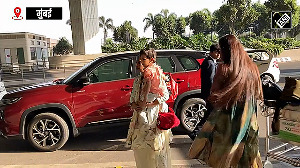Embarking on his first visit to India, US Defence Secretary Robert Gates on Tuesday said he was hopeful that India would clear the civil nuclear deal paving the way for Washington to take it forward.
"We are certainly hopeful that India can get done what it needs to, so that we can get done what needs to be done," Gates told media persons hours after his arrival in New Delhi for discussions with Indian leadership.
But at the same time, Gates made it clear that India and the US military-to-military ties will continue 'independent of the civil nuclear agreement."'
His remark assumes significance as they indicate that Washington wants to give a last minute push to ensure that the deal is ratified before President George W Bush demits office.
Though not on his official schedule, Gates is also seeking a meeting with UPA Chairperson Sonia Gandhi.
The Defence Secretary, leading a 50-member defence-cum-business delegation, made it clear that his visit was focussed more on enhancing military trade and military ties with India.
Asked whether the same nuclear deal will be offered to India if it fails to sign it now, Gates quipped, "I gave up forecasting when I left the CIA."
But on military ties he was more forthcoming saying, "We have a very ambitious schedule of exchanges and exercises that are growing in size and sophistication."
Elaborating, the US Defence Secretary said, 'already, the defence trade relationship is growing. I think there are a number of areas where there is a potential for cooperation between us.'
Gates' comments on Military trade between US and India came in the backdrop of the Indian Cabinet clearing a major deal for purchase of Six C-130 J transport aircraft for Special Forces and induction into Indian armed forces of the Landing ship dock USS Trenton and Government-to-Government sales of six weapon locating radars.
Two major US Companies are among six vying for India's biggest global tender for purchase of 126 fighter aircraft, besides this, American Companies are also trying to sell missiles, anti-missile systems, heavy and medium helicopters, electronic warfare, UAV's and other advanced military systems to India.
"I am impressed by the way the relationship has grown over the past three years," Gates said, stressing that since the signing of the Defence Framework Agreement in 2005, "We have had broader range of interaction between the American and Indian military".
"I am here to explore ways to further expand that relationship," the US leader said in his first interaction with media in New Delhi.
Gates, soon after his arrival, had a long meeting with External Affairs Minister Pranab Mukherjee. The Defence Minister A K Antony is hosting a dinner for him on Tuesday night.
The US Defence secretary has a hectic schedule on Wednesday as he is holding parleys with Antony and then calling on the Prime Minister and leader of the Opposition L K Advani.
In his meeting with BJP strongman, Gates is likely to push for a bipartisan support for the Indo-US civilian nuclear deal.
Advani, who is the leader of the Opposition in the Lok Sabha, is the only prominent opposition leader that the US Defence Secretary would be meeting during his two-day visit.
The one-on-one meeting is seen here as a fresh bid by Washington to shore up support for the civil nuclear agreement as Washington feels that the time is running out.
BJP is opposing the nuclear deal in its current form and has sought re-negotiations.
The renewed US effort comes against the backdrop of New Delhi continuing its parleys with the IAEA in Vienna to tie up a safeguards agreement.
Asked to comment on India test firing its first undersea launched missile, Gates while refusing to be drawn in, merely said, "We have to deal with the world as we find it."
"India is the world's largest democracy. It is in our interest to develop this relationship, just as it is in India's interest. I do not think there is any risk, particularly from our standpoint in doing that. I think we have a lot of opportunities for interaction with the Indians," he said.






 © 2025
© 2025